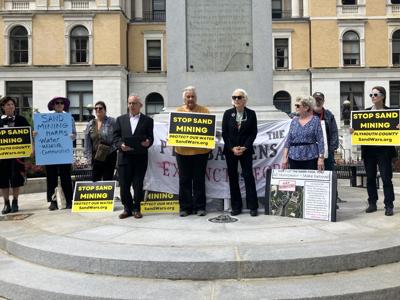Activists Draw Attention To Southeastern Mass. Sand Mining


STATE HOUSE, BOSTON, AUG. 20, 2024…..Activists seeking a moratorium on sand and gravel mining operations in southeastern Massachusetts delivered a petition to Beacon Hill leaders Tuesday demanding action from Gov. Maura Healey and state environmental protection officials.
The Community Land and Water Coalition, which says its mission is to protect the land and waters of southeastern Massachusetts, says widespread mining has negatively impacted local ecosystems, drinking water sources and public health. Meanwhile, state officials say they have not identified any violations in their review of the issue.
“We’re trying to get the message through to Gov. Healey that we really need the state’s leadership and help to control the unregulated sand mining in southeastern Massachusetts that’s destroying our community, our water, our archaeological sites, and we’re up against a huge network of sand mining companies,” Meg Sheehan, coordinator of the coalition and a former assistant attorney general, told the News Service before a press conference in Ashburton Park and delivery of the petition to Healey’s office.
Healey is in Chicago this week for the Democratic National Convention. About 10 activists presented the petition and other information to Healey aides Tuesday afternoon. Sheehan said they were planning to deliver copies of the petition to the co-chairs of the Joint Committee on Environment and Natural Resources, as well.
The petition is also addressed to Secretary of Energy and Environmental Affairs Rebecca Tepper and the select boards of Plymouth, Wareham and Carver. It had amassed 1,455 signatures as of Tuesday afternoon, as organizers seek to reach 1,600.
“We are aware of the concerns raised by advocates about sand mining activities and their potential environmental impacts,” EEA spokesperson Maria Hardiman said in a statement to the News Service. “We have thoroughly considered these concerns when making permitting decisions and conducting inspections, and have not yet identified violations of relevant laws, regulations, or permits and will continue to look into this issue. We met with the advocates last year to address these concerns, and we are committed to conducting a further review of the potential impacts associated with sand mining and addressing specific complaints about environmental regulations.”
A spokesperson for Healey deferred News Service questions to EEA.
Mining operations are contaminating the groundwater, exposing residents to pollution, destroying biodiversity, and harming Native American history in the area, the petition claims. “A moratorium is necessary to put a stop to the mining while our state and federal officials assess the damage to date and ensure the protection of our water and communities,” it says.


The coalition has dubbed southeastern Massachusetts “ground zero” for global sand wars, spurred by a shortage of sand — including silica sand — that’s used in concrete, glass, silicon chips and other products. More than 110 mining sites are situated around the Plymouth/Carver Sole Source Aquifer, and the coalition claims that more than 2,600 acres of land have been mined without regulatory oversight.
At least 61 million cubic yards of sand and gravel have been extracted from the region since about 1990, though that figure is likely an underestimate, the coalition said in a report released in October.
The report blames the cranberry industry for the majority of the mining extraction, but activists on Tuesday did not cite any specific entities they are targeting.
The coalition, according to its website, has battled local governing bodies to thwart mining operations, including pursuing legal action to push the Carver Zoning Board of Appeals to shut down what activists say is a sand and gravel distribution hub owned by A.D. Makepeace Company, which describes itself as North America’s largest cranberry grower.
The report accused cranberry landowners of exploiting state zoning laws, obtaining permits for mining, and then striking a profit from the operations, saying, “It appears that many cranberry landowners are turning to sand and gravel mining as an alternative to growing unprofitable cranberries.”
Brian Wick, executive director of Massachusetts Cranberries, which represents about 330 growers, pushed back against the coalition’s arguments.
“There are few earth removal projects, perhaps less than 10 – let’s not conflate a handful of projects and suggest they represent the industry as a whole,” Wick said. “Sand is a critical natural resource for all productive cranberry bogs but it should not be suggested that all or even many cranberry growers are actually removing earth from their farms.”
Wick said all earth removal projects on cranberry farms are permitted. He said a moratorium on earth removal would be “devastating” to cranberry growers.
“Their access to sand would be eliminated, causing much needed renovation projects to stall or not be financially possible, as well as normal farming practices, utilizing sand, to not be able to occur,” Wick said. “This would further erode the economics of keeping our farms sustainable.”
Sheehan claimed there are no statewide laws requiring entities to secure a permit for earth removal projects. Rather, Sheehan told the News Service local governing bodies issue such permits under industry influence — including from sand mining, cranberry and trucking interest — and without an environmental study process.
“Here in Massachusetts, our state is doing nothing about this issue, so we’re here to raise awareness, to bring this petition to the governor, and to ask our state to step up and require at least environmental impact reports,” Sheehan said at the press conference.
Sheehan said activists have been unsuccessful in past efforts to sound the alarm and secure environmental impact reviews from the Baker administration. Sheehan said activists have also struggled to make traction with the Healey administration, including top environmental officials.
“I think the tricky thing is that until we started exposing it, people didn’t know about it and the breadth of how much is going on,” said Rachel Atkins, a coalition member who grew up in Plymouth and now lives in Vermont. “It might have been one site in your community, but you didn’t realize the next town over has eight sites, and the next town over has 10 more. So we really have spent a lot of the last three years exposing the breadth of the destruction.”
The coalition, in a press release Tuesday, said the Office of the Inspector General is “investigating possible fraud in the municipal regulation of sand mining in Carver, Massachusetts, and other towns.” A spokesperson for the OIG, asked to confirm the investigation, told the News Service the office had “no comment at this time.”
Activists on Tuesday warned mining is jeopardizing the rare Pine Barrens forest in southeastern Massachusetts and hundreds of protected plant and animal species.
Meanwhile, Department of Fish & Game released a five-year strategic plan last week outlining how state officials intend to bolster biodiversity goals to align an executive order from Healey, increase the pace of land protection efforts, ensure the majority of protected land is forested, and restore aquatic ecosystems, among other policies.
“The Pine Barrens are a crucial ecological resource, and we will continue to collaborate with all interested parties to address any concerns,” Hardiman said.
Linda Jacobs, who lives in a mobile home community in Carver near two sand mining operations, called the scenery “very ugly.”
“It’s upsetting to look at, knowing that so many trees have been destroyed and wildlife has been de-homed,” Jacobs said. “There’s days where I can hear them operating trucks and digging equipment with my windows closed. It’s unsettling. I don’t like the noise, but also I don’t like what it represents.”


